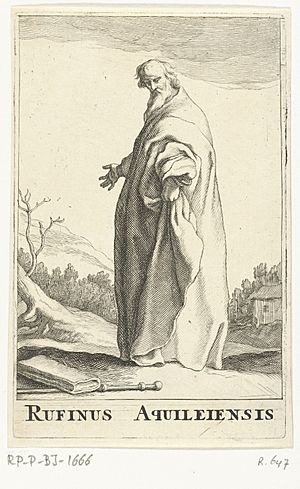Tyrannius Rufinus facts for kids
Tyrannius Rufinus, also known as Rufinus of Aquileia (born around 344 or 345, died 411), was a monk, thinker, historian, and religious scholar. He is famous for translating many important Greek Christian writings into Latin. He especially worked on the writings of Origen, an early Christian teacher.
Contents
Life of Rufinus
Rufinus was born in 344 or 345 in a Roman city called Julia Concordia, which is now in Italy. His family were Christians.
Around the year 370, Rufinus was living in a monastery in Aquileia. There, he met another famous scholar named Jerome. About two years later, in 372, Rufinus traveled with Jerome to the eastern Mediterranean.
In Egypt, Rufinus studied in Alexandria with a teacher called Didymus the Blind. He also became friends with other holy men in the desert. While in Egypt, he met Melania the Elder, a rich and religious Roman woman.
When Melania moved to Palestine, Rufinus followed her. He arrived in Jerusalem in 380. Melania lived in a convent there. Rufinus, with her help, started a new monastery on the Mount of Olives. He spent his time studying Greek religious texts.
In 386, Jerome came to Bethlehem, and their friendship grew stronger. Jerome also started a similar community nearby. Rufinus became friends with John II, Bishop of Jerusalem, who made him a priest in 390.
In 394, a big argument started because of attacks on Origen's teachings. Epiphanius of Salamis visited Jerusalem and criticized Origen. Rufinus and Jerome, who had both admired Origen, took different sides in this argument. Jerome felt Rufinus was not strong enough in his criticism of Origen.
They tried to make peace three years later, but it did not last.
In 397, Rufinus sailed to Rome. People in Rome were very interested in the religious debates happening in the East. So, Rufinus published a Latin translation of a book called Apology of Pamphilus for Origen. He added a note saying that some controversial ideas in Origen's work might have been added later by others.
In 398 or 399, Rufinus published his own translation of Origen's De Principiis (On First Principles). In this translation, he made the controversial parts sound less extreme. In his introduction, Rufinus mentioned Jerome as someone who also admired Origen and had translated some of his works. This annoyed Jerome, who was very protective of his reputation as a scholar.
This led to a bitter exchange of writings between them. Rufinus wrote Against Jerome, and Jerome wrote Against Rufinus.
Later, Pope Anastasius I (399-401) asked Rufinus to come to Rome to explain his beliefs. Rufinus sent a written defense instead, called Apologia pro fide sua. The Pope condemned Origen's ideas but left Rufinus's own beliefs up to his conscience. Still, some people were suspicious of Rufinus.
Rufinus spent most of the early 400s translating Origen's works. He translated many of Origen's sermons on different parts of the Old Testament and his Commentary on Romans. This translation helped start new discussions about fate and free will in Rome.
Rufinus also translated other important books. In 401, he translated Eusebius' Ecclesiastical History (Church History). He did this at the request of Bishop Chromatius of Aquileia. Rufinus added two new books to Eusebius' history, bringing the story up to the year 395.
Rufinus often translated books because friends or supporters asked him to. Between 397 and 408, he lived in Italy, mostly in Rome and Aquileia. In 408, he had to move because Alaric and his Goths invaded northern Italy. When Alaric moved south and attacked Rome in 410, Rufinus fled to Sicily. He died in Sicily in 411.
Works of Rufinus
Rufinus wrote some of his own books and translated many others from Greek into Latin.
Original Writings
- Commentarius in symbolum apostolorum: This book explains the Apostles' Creed, which is a statement of Christian beliefs. It shows how the Creed was used in Italy in the 300s.
- The Church History of Rufinus of Aquileia: This was his own history of the church.
- De Adulteratione Librorum Origenis: In this book, Rufinus argued that some parts of Origen's writings that people found problematic were not actually written by Origen himself.
- Apologia pro Fide Sua ad Anastasium Pontificem: This was his defense of his faith, sent to Pope Anastasius.
- Historia Eremitica: This book tells the life stories of thirty-three monks who lived in the desert.
Translations from Greek to Latin
Rufinus translated the Historia Ecclesiastica by Eusebius of Caesarea. He also continued this history from the time of Constantine I to the death of Theodosius I in 395. This was published around 402 or 403.
Many of Origen's writings, like his commentary on the New Testament Epistle to the Romans and many sermons, only exist today because Rufinus translated them. The full text of Origen's De principiis (On First Principles) also only survives in Rufinus's translation. Jerome, who was once Rufinus's friend, later criticized his translations.
Other important translations by Rufinus include:
- Writings by Basil of Caesarea.
- The Apology of Pamphilus.
- More of Origen's sermons.
- De recta in Deum fide by Pseudo-Origen.
- Works by Gregory of Nazianzus.
- Writings by Sixtus and Evagrius.
- The Clementine Recognitions, which is now only known through Rufinus's translation.
- The Canon Paschalis by Anatolius Alexandrinus.
- The books Antiquities and The Jewish War by Josephus.
Rufinus's Influence
Rufinus had a big impact on Western religious thinkers. By translating the works of great Greek Christian writers into Latin, he made their ideas available to many more people. This helped spread knowledge and understanding of early Christian thought throughout the Western Roman Empire.
See also
 In Spanish: Rufino de Aquilea para niños
In Spanish: Rufino de Aquilea para niños
 | Percy Lavon Julian |
 | Katherine Johnson |
 | George Washington Carver |
 | Annie Easley |


